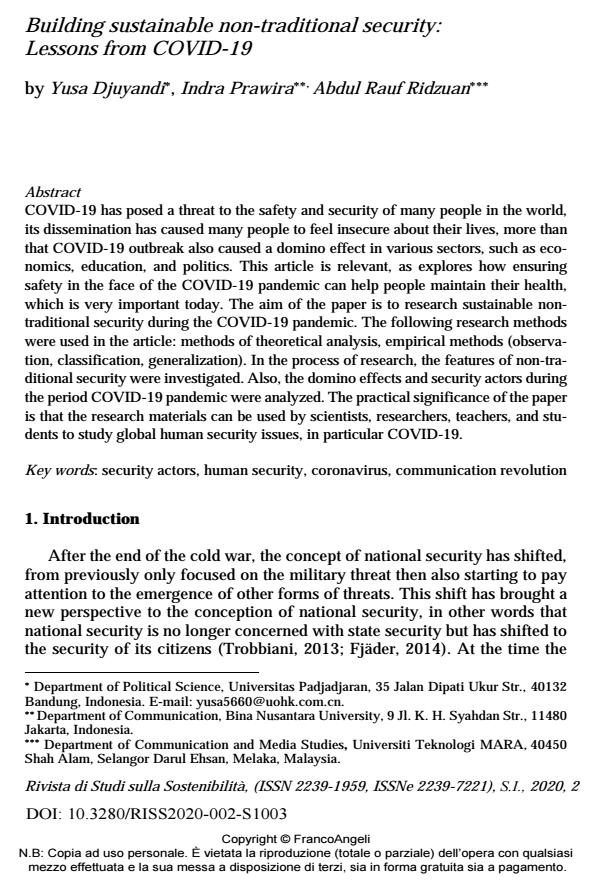Building sustainable non-traditional security: Lessons from COVID-19
Titolo Rivista RIVISTA DI STUDI SULLA SOSTENIBILITA'
Autori/Curatori Yusa Djuyandi, Indra Prawira, Abdul Rauf Ridzuan
Anno di pubblicazione 2021 Fascicolo 2020/2 suppl.
Lingua Inglese Numero pagine 14 P. 19-32 Dimensione file 154 KB
DOI 10.3280/RISS2020-002-S1003
Il DOI è il codice a barre della proprietà intellettuale: per saperne di più
clicca qui
Qui sotto puoi vedere in anteprima la prima pagina di questo articolo.
Se questo articolo ti interessa, lo puoi acquistare (e scaricare in formato pdf) seguendo le facili indicazioni per acquistare il download credit. Acquista Download Credits per scaricare questo Articolo in formato PDF

FrancoAngeli è membro della Publishers International Linking Association, Inc (PILA), associazione indipendente e non profit per facilitare (attraverso i servizi tecnologici implementati da CrossRef.org) l’accesso degli studiosi ai contenuti digitali nelle pubblicazioni professionali e scientifiche.
COVID-19 has posed a threat to the safety and security of many people in the world, its dissemination has caused many people to feel insecure about their lives, more than that COVID-19 outbreak also caused a domino effect in various sec-tors, such as economics, education, and politics. This article is relevant, as explores how ensuring safety in the face of the COVID-19 pandemic can help people main-tain their health, which is very important today. The aim of the paper is to research sustainable non-traditional security during the COVID-19 pandemic. The following research methods were used in the article: methods of theoretical analysis, empiri-cal methods (observation, classification, generalization). In the process of re-search, the features of non-traditional security were investigated. Also, the domino effects and security actors during the period COVID-19 pandemic were analyzed. The practical significance of the paper is that the research materials can be used by scientists, researchers, teachers, and students to study global human security issues, in particular COVID-19.
Parole chiave:Security actors, human security, coronavirus, communication revolu-tion
Yusa Djuyandi, Indra Prawira, Abdul Rauf Ridzuan, Building sustainable non-traditional security: Lessons from COVID-19 in "RIVISTA DI STUDI SULLA SOSTENIBILITA'" 2 suppl./2020, pp 19-32, DOI: 10.3280/RISS2020-002-S1003